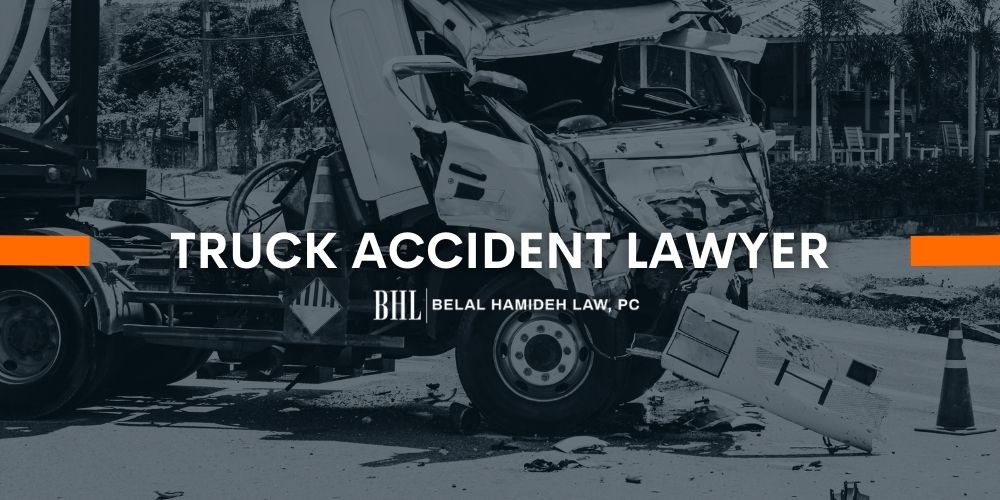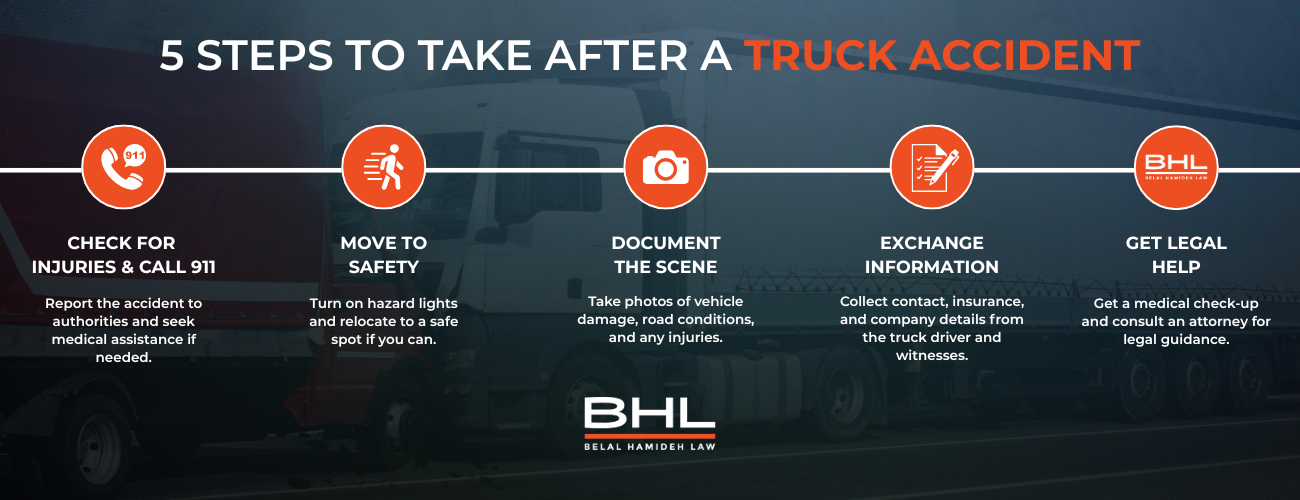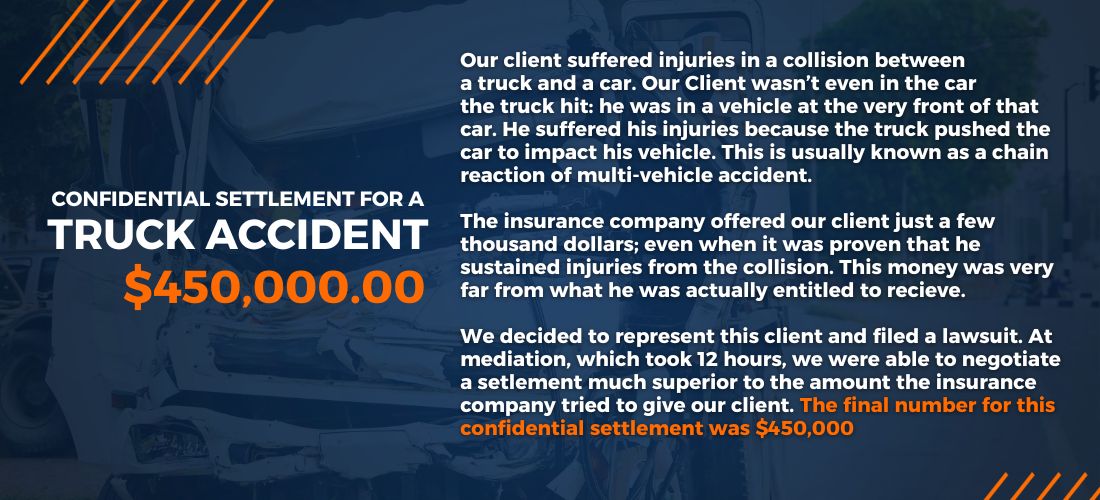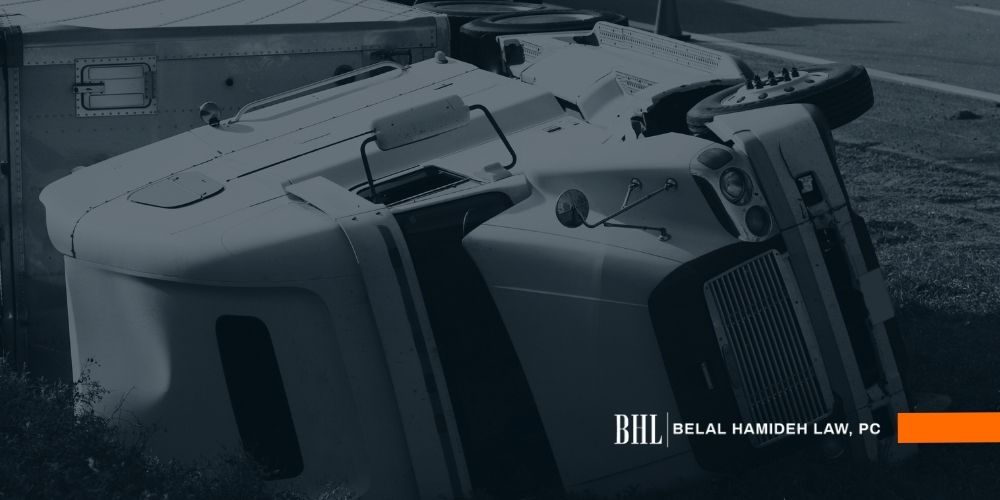
The 710, 405, and 605 freeways are some of the busiest freeways in the nation, making them hot spots for truck accidents in Long Beach, California. Due to the disparity in sizes of commercial trucks and passenger vehicles, the occupants in the smaller vehicle tend to suffer serious injuries or fatalities when their vehicles collide.
If you were injured or a loved one was rendered disabled or died in a truck accident, a Long Beach truck accident lawyer from Belal Hamideh Law, P.C. can help. Contact us today for a free case review.
The Importance of Legal Representation in Truck Accident Cases
Trucking companies and their insurance providers often employ aggressive strategies to minimize payouts by:
- Disputing the necessity of certain treatments
- Challenging the severity of pain claims
- Ignoring future care requirements
- Using generic formulas that don’t reflect individual circumstances
- Sending investigators to the accident scene immediately and collecting evidence to weaken the victim’s claim.
Legal representation is critical in countering these tactics. A skilled truck accident lawyer can manage the complexities of your case, identify all responsible parties, and build a compelling argument to secure the compensation you are entitled to. By having experienced legal advocates on your side, you can focus on your recovery while they handle the negotiations and litigation.
State and Federal Regulations Governing Truck Operations
One of the complicating factors involved in truck accident cases is that they may involve complex truck regulations. If the truck driver, trucking company, or other party violated relevant rules and that violation contributed to the accident, they may be responsible for the resulting injuries.
Federal and state regulations govern all of the following:
- Hours of service: Federal hours of service rules dictate how long interstate drivers can work and operate a truck in a given way. Current rules limit work to 14 hours per day and driving time to 11 consecutive hours after taking 10 hours off duty. These rules are designed to prevent fatigued driving, which is associated with slowed reaction times, lapses in judgment, and falling asleep behind the wheel.
- Licensing requirements: Truck drivers must have a commercial driver’s license (CDL) to operate a commercial truck, which requires passing a skills test and a written test. They must also have training in the safe operation of a commercial motor vehicle.
- Weight limits: Commercial trucks are subject to California weight limits. They must carry a special permit if the load exceeds the limits.
- Drug and alcohol testing: Trucking companies must perform drug and alcohol testing at certain intervals, including before hiring truck drivers, after a crash, upon return to service, and randomly.
- Routine maintenance: Truck companies must ensure their trucks are safe to operate before putting them on the road. They must conduct regular maintenance and inspections and maintain these records.
- Cargo securement: Truckers and third parties must properly secure cargo before transporting it so it does not shift during transit, fall off, or spill on the road.
An experienced truck accident attorney can investigate your case to determine how the crash occurred and who is responsible for it.
Common Causes of Truck Accidents in Long Beach
The trucking industry involves many parties, any of whom can contribute to truck crashes. As such, various factors can result in a truck accident, including:
- Driver error: With a higher center of gravity, longer stopping distances, and a larger turning radius, commercial trucks are hard to drive. A driver can make a grave error, resulting in a serious crash.
- Inexperienced drivers: Truck driving is hard work, often requiring long work days away from family. As such, there is often a shortage of experienced drivers, leading trucking companies to hire newly licensed drivers or offer inexperienced drivers incentives to work for them. Inexperienced drivers are more likely to make mistakes that result in accidents.
- Distracted driving: In addition to cell phones, truck drivers could be distracted by CB radios, onboard cameras, electronic logging devices, GPS instructions, and other stimuli. Distractions increase the stopping time needed to prevent a collision after noticing a hazard, which is already greater for large trucks.
- Driver fatigue: Truck drivers often work long hours, often at night or in the early morning, when there is less traffic. This can contribute to truck drivers being tired behind the wheel. Despite federal laws prohibiting working too many hours, some truckers and the companies they work for ignore these safeguards and put others on the road at risk.
- Speeding: Truck drivers may be under tight delivery schedules, which may cause them to speed. However, speeding increases stopping distances and increases the likelihood that a driver will lose control of their vehicle.
- Impaired driving: Some truck drivers turn to drugs or alcohol to cope with the difficulty of their job and other problems. Because truck drivers are responsible for such large vehicles, an impaired state can substantially jeopardize the safety of others on the roadway.
- Maintenance issues: Large trucks could have blown tires, faulty brakes, or other mechanical issues that cause them to crash.
- Cargo problems: Cargo could have been improperly loaded so that it shifts during transit, exceeds weight limits, or falls off into the unsuspecting path of other motorists.
- Cargo securement: Truckers and third parties must properly secure cargo before transporting it so it does not shift during transit, fall off, or spill on the road.
- Truck defects: Commercial trucks may have a defect that contributes to a crash.
Truck accidents caused by these factors often result in serious injuries.
Common Truck Accident Injuries
The weight of the commercial truck, the speed at which the vehicle was traveling, and the cargo it was carrying can all lead to devastating and life-altering injuries. Some of the most severe injuries truck accident victims suffer include the following:
- Amputations
- Traumatic brain injuries
- Spinal cord injuries
- Internal organ damage
- Nerve damage
- Broken bones
Tragically, many truck crashes cause fatal injuries.
What if My Injuries Develop Weeks After the Truck Accident?
The adrenaline and shock from a truck accident can mask pain and injuries in the immediate aftermath. Additionally, certain soft tissue injuries, such as whiplash, concussions, or internal bleeding, may not show symptoms right away. Over time, inflammation, nerve damage, or underlying trauma can become more apparent. If you start experiencing headaches, dizziness, back pain, or other unusual symptoms days or weeks after the crash, it could be related to the accident.
If you were involved in a truck accident in Long Beach, you may not immediately feel the full extent of your injuries. Some injuries take days, weeks, or even months to manifest noticeable symptoms. If this happens, you should get medical attention as quickly as possible. Then, reach out to an attorney. Do not sign anything from anyone connected to an insurance company.
($1,300,000.00)
Our office represented a minor who ran into the street after being startled by a dog in a neighbor’s home. After he ran into the street, he was struck by a truck and sustained several broken bones. Our office assisted him in obtaining maximum medical improvement for his injuries. The dog owner’s home insurance company aggressively denied that they were responsible for our client’s injuries. After several years of hard-fought litigation, the dog owner’s home insurance company settled our client’s claim for 1 million dollars more than their policy limit. We also obtained a policy limit settlement from the truck driver who struck our client.
Who Is Responsible for My Long Beach Truck Accident?
If you or a loved one suffered any of the serious injuries described above, you might be wondering who is responsible for paying for your injuries. Several parties could bear liability for your accident, including the following:
Truck Driver
Truck drivers are required to follow all traffic laws, maintain situational awareness, and take evasive maneuvers to avoid collisions. Truck drivers should also be mindful of the size of the vehicle under their care. Semi trucks can weigh up to 80,000 pounds and cause devastation in their wake when they collide with a vehicle weighing only a few thousand pounds. When truck drivers make mistakes or drive negligently, they can be held responsible for the accidents they cause.
Trucking Company
In the past, trucking companies avoided liability by hiring independent contractors. If these drivers, who were not their employees, were involved in a crash, they would shift liability to them. They would also lease their fleet of vehicles rather than owning them.
However, federal laws were enacted that eradicated these evasive maneuvers. Now, trucking companies can be held liable for the negligent actions of their drivers and their trucks, regardless of their employment or ownership status.
Additionally, trucking companies can be held liable for their own forms of negligence, such as:
- Hiring inexperienced drivers
- Hiring dangerous drivers with known safety violations or drug problems
- Failing to train drivers
- Encouraging or requiring drivers to violate hours of service or other safety rules
- Ignoring maintenance on their fleet
- Improperly loading cargo
Cargo Loading Company
If the trucking company outsourced cargo loading to an independent company, this third party could be responsible for an accident caused by cargo problems.
Mechanics
If the trucking company outsourced its maintenance duties to a third party, and that party negligently performed repairs or did not provide proper maintenance, it could be held responsible for the resulting accident.
Truck or Parts Manufacturers
If a truck or part defect contributed to the crash, you could seek to hold the manufacturer responsible for your injuries.
Other Motorists
Other motorists may not drive safely around large trucks and could be responsible for truck accidents.
The Government
The City of Long Beach could be responsible for crashes caused by unreasonably hazardous roadways.
Damages Available After a Truck Accident
California personal injury victims can pursue legal claims to make them “whole again” after a truck crash. They can pursue compensation for the damages they sustain in a truck wreck, such as:
Medical expenses
You can seek compensation for emergency medical treatment, including for ambulance charges, hospital stays, emergency room treatment, and diagnostic tests. You can also pursue compensation for medical bills you are continuing to incur due to the accident, such as follow-up visits, medical equipment, and prescription medication. You can also request compensation for your anticipated future medical expenses.
Hospitalization Costs
- Intensive care unit stays
- Surgical procedures
- Anesthesia and operating room fees
- Diagnostic imaging (CT scans, MRIs, X-rays)
Ongoing Treatment Requirements
- Physical therapy and rehabilitation
- Prescription medications
- Mobility aids (wheelchairs, walkers)
- Home health care services
Future Medical Needs
For catastrophic injuries like spinal cord damage or traumatic brain injuries:
- Anticipated additional surgeries
- Long-term nursing care
- Adaptive home modifications
- Specialized medical equipment
Property damage
The negligent party should pay to have your damaged vehicle repaired or replaced. Other property damage considerations include:
- Total loss valuations
- Rental car expenses during repairs
- Damage to personal items in the vehicle
- Special equipment for modified vehicles
Lost Income and Earning Capacity
The financial repercussions of a truck accident often extend well beyond immediate missed paychecks:
Documentable Lost Wages
- Time missed during hospitalization
- Recovery period away from work
- Reduced hours during rehabilitation
Diminished Earning Potential
For victims who can no longer work in their previous capacity:
- Career changes necessitated by permanent disabilities
- Reduced hourly wages in new positions
- Lost opportunities for advancement
- Inability to perform overtime work
Permanent disabilities and impairments
In the case of catastrophic injuries, you can seek compensation for in-home care and home modifications.
Non-economic damages
In addition to having the right to pursue compensation for your economic damages, which have a direct quantifiable value, you can seek compensation for your non-economic damages, such as:
Physical Pain Components
- Immediate trauma from injuries
- Chronic pain conditions
- Discomfort from ongoing treatments
- Reduced mobility and function
Emotional and Psychological Impact
- Post-traumatic stress disorder (PTSD)
- Emotional distress
- Anxiety and depression
- Sleep disturbances
- Loss of spousal companionship (loss of consortium)
- Increased household burdens
- Diminished or loss of enjoyment of daily activities
The amount of compensation awarded depends on several factors, such as the severity of the injuries sustained and the degree of fault assigned to each party. The physical, emotional, and financial toll of a truck accident can be immense. With the right legal representation, victims can focus on their recovery while knowing that their case is in capable hands. By leveraging extensive legal knowledge and resources, Belal Hamideh aims to deliver justice and secure the compensation his clients deserve for the hardships they have endured.
An experienced Long Beach injury attorney from our law firm can carefully review your case and determine the damages you can include as part of your claim.
What to Do After a Truck Accident?
- Alert the Authorities. Regardless of how trivial the accident appears or even if no apparent injuries have been sustained, it’s imperative to notify the police. Complications can materialize with time, manifesting damage to both you and your vehicle. The police will then document a report, which stands as essential evidence in support of your claim.
- Pursue Medical Assistance. Post-accident, you may feel as if you’ve come out unscathed. However, unseen internal injuries could possibly be there, lying dormant. Consulting a medical professional for a check-up and recording that you sought medical attention can significantly strengthen your claim following an accident.
- Gather Evidence, if Physically Capable. If incapacitated or still in danger, prioritize your safety above gathering evidence. However, if you can mobilize, capturing pictures of your physical injuries and vehicular damage is incredibly beneficial. Documenting any environmental evidence that may vanish with time, like skid marks or wreckage to adjacent structures, is also advisable.
Gathering Evidence and Comprehensive Record Documentation
Police reports, witness statements, medical reports, physical evidence (photos/videos), accident reconstructionism, expert testimony, and more can all be utilized by a trucking accidents lawyer to help your case.
- Police Reports. One of the first pieces of evidence collected after a truck accident is the police report. Law enforcement officers who respond to the scene will document their observations, including statements from drivers, witnesses, and any visible factors that may have contributed to the crash. The report may include details such as road conditions, weather, traffic violations, and whether any citations were issued. While the police report itself is not definitive proof of fault, it serves as a foundational document that can support your case.
- Driver Logs and Maintenance Records. Federal regulations require trucking companies to maintain accurate records of driver logs and vehicle maintenance. Driver logs can show whether the trucker was exceeding legal driving hours, which is a common cause of fatigue-related accidents. Maintenance records, on the other hand, can reveal whether the trucking company neglected necessary repairs, leading to mechanical failures such as brake malfunctions or tire blowouts. If a company fails to adhere to safety standards, these records can be pivotal in proving negligence.
- Witness Statements in Truck Accident Cases. Witness statements can play a pivotal role in truck accident cases, often providing an unbiased, third-party account of what happened. Unlike the involved drivers who may have conflicting versions of events, witnesses can offer crucial details that help reconstruct the accident and establish liability. Witnesses can come from various sources, including:
- Bystanders: Pedestrians, nearby drivers, or people in adjacent businesses who saw the accident happen.
- Passengers: Individuals in your vehicle or other cars involved may provide key details about the moments before impact.
- Other Drivers: Motorists who were on the road at the time may have seen the truck driver’s behavior before the crash.
- Workers or Delivery Personnel: If the accident occurred near a construction site, warehouse, or loading zone, employees in the area may have observed unsafe truck operations.
- Photos and Video Evidence. Visual evidence in the form of photographs and video footage can be among the most compelling pieces of evidence in a truck accident case. Unlike witness recollections, which may fade or vary over time, images and recordings provide an objective, unaltered account of the scene, vehicle damage, road conditions, and other critical factors. Given the sheer size and force of commercial trucks, thorough visual documentation can help reconstruct the accident, demonstrate liability, and counter any attempts by insurance companies or the trucking company to minimize fault.
- Scene Photos: Wide shots of the entire accident site, including traffic signals, crosswalks, and surrounding landmarks.
- Close-Up Damage Photos: Detailed images of vehicle crumple zones, broken parts, and any cargo spills.
- Injury Documentation: Visible wounds, bruises, or other injuries sustained in the crash (though privacy and sensitivity should be considered).
- Phone Videos: If a witness recorded the aftermath, their footage could show the truck driver’s behavior, statements, or hazardous conditions.
- Expert Testimony. While not evidence in itself, expert testimony can help interpret complex evidence and clarify how the accident occurred. Accident reconstruction specialists, medical professionals, and trucking industry professionals may be called upon to explain factors such as vehicle dynamics, injury causation, or regulatory violations. Their input can be instrumental in proving liability, especially in cases where the trucking company disputes fault.
- Trucking Company Policies and Training Records. Trucking companies are required to follow strict hiring and training protocols. If an investigation reveals that the driver was improperly trained or had a history of violations, this could indicate negligence on the part of the employer. Similarly, company policies regarding load limits, maintenance schedules, and driver oversight may be scrutinized. Violations of federal or state regulations can significantly bolster your case.
- Cargo and Load Documentation. Improperly secured or overloaded cargo is a leading cause of truck accidents. Shipping manifests, weight tickets, and loading records can determine whether the truck was carrying an unsafe load. If cargo shifted or spilled, causing or contributing to the accident, these documents can help establish liability against the trucking company or loading contractors.
- Why Prompt Evidence Collection Matters. Evidence in truck accident cases can disappear quickly. Trucking companies and insurers may act swiftly to protect their interests, sometimes leading to the destruction or alteration of critical records. An attorney can send preservation letters to ensure that key evidence, such as black box data, driver logs, and maintenance records, is not tampered with or lost.
Medical Record and Treatment Documentation
Injuries from truck accidents are often severe, requiring extensive medical treatment. Your medical records serve as proof of the harm you suffered and the associated costs. These documents should include emergency room reports, surgical records, imaging results, rehabilitation notes, and any long-term care plans. Linking your injuries directly to the accident is essential for securing compensation for medical expenses, lost wages, and pain and suffering.
- Organizing all medical bills and explanations of benefits
- Maintaining a pain and symptom diary
- Tracking mileage to medical appointments
- Documenting home care needs through photos/videos
- Preserving receipts for all accident-related expenses
What Is My Time Limit to File a Truck Accident Lawsuit in Long Beach?
The statute of limitations for most personal injury cases, including truck accident lawsuits, is two years from the date of the accident. However, exceptions may apply that shorten or lengthen this timeframe, such as if the injury victim was a minor or the government is a named party, respectively. If the applicable deadline passes and you have not filed a lawsuit, you can forfeit your right to bring suit in court and recover compensation for your losses. It is best to work with an experienced attorney who can review your case and take timely legal action on your behalf.
A Trucking Accidents Lawyer Fighting for Maximum Compensation
An experienced truck accident lawyer knows what evidence to look for and how to gather it effectively. This includes proper investigation by reviewing accident reports, examining the truck’s maintenance records, analyzing the driver’s logbooks, and interviewing witnesses. We leave no stone unturned in our pursuit of justice. We work with accident reconstruction experts, medical professionals, and other specialists to build a compelling case.
Belal Hamideh has a proven track record of holding all responsible parties accountable. Our attention to detail ensures that we can identify all responsible parties, whether it’s the driver, the trucking company, or a third party like a manufacturer. We understand how to navigate the legal complexities of these cases and ensure that no one escapes liability. By identifying and pursuing all potential sources of compensation, we maximize the chances of securing a favorable outcome for our clients.
The aftermath of a truck accident can be devastating. Victims often face mounting medical bills, lost wages, and long-term rehabilitation needs. In some cases, they may be unable to return to work or enjoy the same quality of life they had before the accident. An experienced truck accident lawyer understands the financial and emotional toll these accidents can take and is committed to helping clients recover the compensation they deserve. At Belal Hamideh Law, we take a comprehensive approach to assessing damages. This includes not only current medical expenses and lost income but also future care needs, pain and suffering, and other non-economic damages. We are not afraid to take on large insurance companies or corporate defendants to ensure that our clients receive fair and just compensation.
Winning a truck accident case requires more than just legal knowledge; it requires determination, strategic thinking, and a deep understanding of the law. Belal Hamideh has demonstrated time and again that he has what it takes to win. His success in handling complex truck accident cases has earned him the trust and respect of clients and peers alike.
Belal Hamideh’s dedication to his clients is evident in every case he takes on. He is not just a lawyer; he is a steadfast advocate who fights tirelessly for justice. For those in Long Beach and the surrounding areas who have been injured in a truck accident, Belal Hamideh is a trusted ally who knows how to deliver results.
Contact Our Truck Accident Attorneys for a Free, No-Obligation Consultation
If you or a loved one was injured in a truck accident primarily the fault of someone else, you should not have to pay the consequences. An experienced truck accident lawyer from Belal Hamideh Law, P.C. can help you with every aspect of your personal injury claim, from start to finish.
Because we take cases on a contingency fee basis, you don’t have to pay anything up front. We can discuss your legal rights and obligations during a free consultation. Contact us today to get started. A member of our bilingual legal team will be available to assist you.



